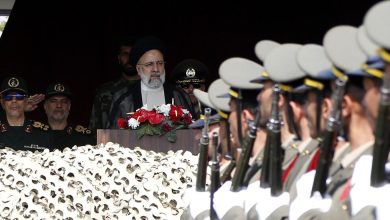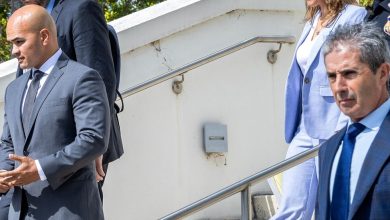Texas Synagogue Hostage Taker Had ‘Mental Health Issues,’ Brother in U.K. Says

BLACKBURN, England — The British man named by the F.B.I. as the person who took four people hostage at a Texas synagogue on Saturday had serious mental health issues and arguably should not have been able to travel to America at all, his brother said in an interview on Monday.
Malik Faisal Akram, 44, from Blackburn in northwestern England, was killed after an 11-hour standoff with the police and law enforcement officers at the Congregation Beth Israel in Colleyville, Texas, near Fort Worth, the F.B.I. said.
His brother Gulbar Akram described him in a telephone interview as a deeply troubled man who had grown distant from his family members in recent years.
“He had mental health issues,” his brother said in the interview. “It’s well known, everybody in the town knows, he has mental health issues.” He did not provide further details.
The British authorities, including the Greater Manchester Police and the Home Office, did not immediately respond to requests for comment.
Gulbar Akram said he was on the phone with his brother, who went by the name Faisal, as the F.B.I. and the authorities in Texas tried to negotiate with him during the standoff on Saturday. He described a tense and emotional conversation with his brother, whom he said he had tried to talk into releasing the hostages and turning himself in as the standoff dragged on into the evening.
After all the hostages were released, Faisal Akram died, though the authorities have not provided details of how.
His brother said he did not believe his brother held antisemitic or racist beliefs, and that he had a recording of a phone call to his brother when he was in the synagogue, in which he referred to the hostages as “four beautiful Jews.”
Mr. Akram said he was he was with the authorities at a station in Manchester on Saturday and was watching the episode through the police surveillance feed there. “I was in the incident room with terrorism police, with the negotiators, liaising with the F.B.I., who were in touch with Washington,” he said. “Everybody was connected in that room, right?”
“We watched him release the first hostage,” Mr. Akram said, describing how an hour later, he watched as the other three hostages were released through the fire door.
Gulbar Akram said the last time he saw his brother was three months ago, at the funeral for another of their brothers, who had died from complications from the coronavirus. Since then, his brother’s mental state had further deteriorated, Mr. Akram said.
“I don’t know what was going through his mind,” Mr. Akram said, adding that he did not believe that his brother had any previous connections to the Texas area where the synagogue is. Mr. Akram said his brother had been known to the counterterrorism police in Britain, but did not provide details.
“How had he gotten into America?” Mr. Akram said. “Why was he granted a visa? How did he land at J.F.K. airport and not get stopped for one second?”
Mr. Akram said his parents, who are elderly, were “devastated,” adding, “We’ve lost two brothers within four months.”
Their parents arrived in Britain from Pakistan in the 1960s, Mr. Akram said, and raised their six sons in Blackburn, a large town in northwestern England which is home to a substantial South Asian community. Mr. Akram said his parents were not involved in the hostage negotiations.
The British authorities are working with counterterrorism police, they have said.
Late on Sunday, the Greater Manchester Police Department in England announced that it had detained two teenagers for questioning in connection with the investigation.
Faisal Akram landed at Kennedy International Airport in New York before traveling to Texas. He had entered the United States legally, according to two U.S. officials, who spoke on the condition of anonymity because they were not authorized to talk publicly about the continuing investigation.
Faisal Akram, who was one of six brothers, had been married with six children of his own and lived with them in Manchester for a number of years.
According to his brother, he was arrested in the 1990s when he was 19 and sent to a young offenders’ institute, and was later sentenced to six months in prison for violent disorder for wielding a baseball bat during a family feud with his cousins. Those details could not immediately be independently verified.
Gulbar Akram said that his family had shared a short, private statement among community members over the weekend, which described in detail their cooperation with the police. It was later posted on a Facebook page without their permission, he said.
In it, they shared their sadness as a family and said they wanted to “sincerely apologize wholeheartedly to all the victims.”
Mr. Akram, a local businessman who lives on a street of red brick houses on a hill overlooking the town, was reached by phone on Monday after a family member provided his details.
The northern industrial town has drawn Pakistani and Indian migrants since the 1950s, initially to jobs in the area’s once-thriving textile industry. Blackburn has one of the largest Asian populations in Britain, with almost a third of its population identifying as Asian or Asian British, according to the 2011 census.
On Monday, the Muslim Council of Britain condemned the hostage-taking and expressed its solidarity with the Jewish community in a statement from Zara Mohammed, the council’s secretary-general.
“The act is all the more reprehensible since it was instigated at a place of worship where Jews were targeted,” the statement said, adding; “We are thankful that the hostages are unharmed. Though some may seek to exploit such incidents for divisive ends, we must double our resolve to remain united against such hatred.”




